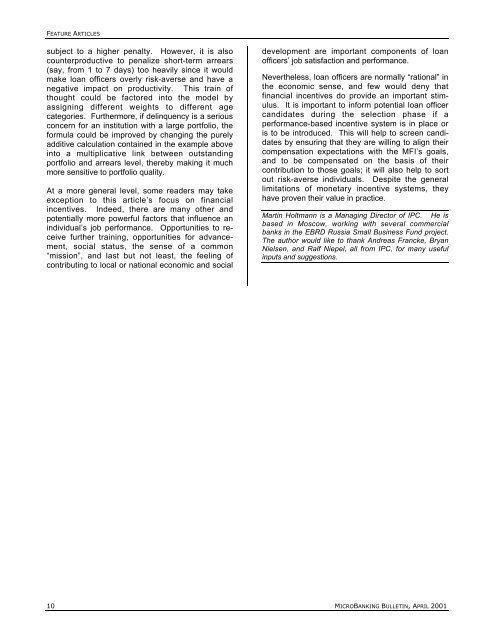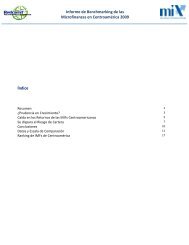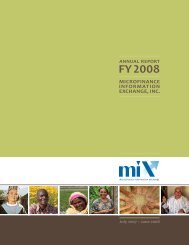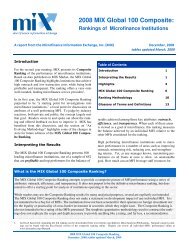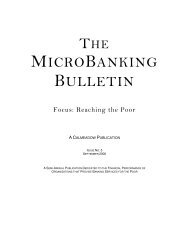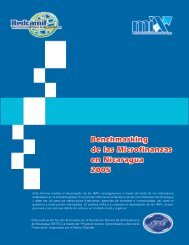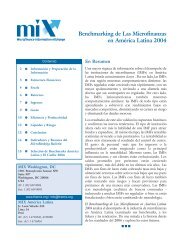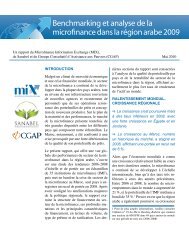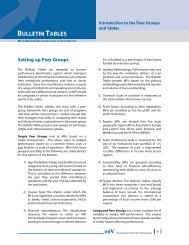FEATURE ARTICLESsubject to a higher penalty. However, it is alsocounterproductive to penalize short-term arrears(say, from 1 to 7 days) too heavily since it wouldmake loan officers overly risk-averse and have anegative impact on productivity. This train ofthought could be factored into <strong>the</strong> model byassigning different weights to different agecategories. Fur<strong>the</strong>rmore, if delinquency is a seriousconcern for an institution with a large portfolio, <strong>the</strong>formula could be improved by changing <strong>the</strong> purelyadditive calculation contained in <strong>the</strong> example aboveinto a multiplicative link between outstandingportfolio and arrears level, <strong>the</strong>reby making it muchmore sensitive to portfolio quality.At a more general level, some readers may takeexception to this article’s focus on financialincentives. Indeed, <strong>the</strong>re are many o<strong>the</strong>r andpotentially more powerful factors that influence anindividual’s job performance. Opportunities to receivefur<strong>the</strong>r training, opportunities for advancement,social status, <strong>the</strong> sense of a common“mission”, and last but not least, <strong>the</strong> feeling ofcontributing to local or national economic and socialdevelopment are important components of loanofficers’ job satisfaction and performance.Never<strong>the</strong>less, loan officers are normally “rational” in<strong>the</strong> economic sense, and few would deny thatfinancial incentives do provide an important stimulus.It is important to inform potential loan officercandidates during <strong>the</strong> selection phase if aperformance-based incentive system is in place oris to be introduced. This will help to screen candidatesby ensuring that <strong>the</strong>y are willing to align <strong>the</strong>ircompensation expectations with <strong>the</strong> MFI’s goals,and to be compensated on <strong>the</strong> basis of <strong>the</strong>ircontribution to those goals; it will also help to sortout risk-averse individuals. Despite <strong>the</strong> generallimitations of monetary incentive systems, <strong>the</strong>yhave proven <strong>the</strong>ir value in practice.Martin Holtmann is a Managing Director of IPC. He isbased in Moscow, working with several commercialbanks in <strong>the</strong> EBRD Russia Small Business Fund project.The author would like to thank Andreas Francke, BryanNielsen, and Ralf Niepel, all from IPC, for many usefulinputs and suggestions.10 MICROBANKING BULLETIN, APRIL 2001
FEATURE ARTICLESWe Aren’t Selling Vacuum Cleaners:PRODEM’s Experiences with Staff IncentivesEduardo BazoberryMany people in microfinance are familiar withPRODEM because it was <strong>the</strong> NGO that createdBancoSol, <strong>the</strong> first commercial bank solely dedicatedto microfinance. Since BancoSol’s creation in1992, PRODEM has quietly gone about doingsomething more challenging than establishing abank. First, we developed loan products for microentrepreneursand small-scale farmers in sparselypopulated rural Bolivia. Then we expanded ourorganization while continuously improving our loanproducts in response to our customers’ needs. Wesurvived a weak economy and a crisis in <strong>the</strong>microfinance industry in 1999, and <strong>the</strong>n we createdano<strong>the</strong>r regulated financial institution known as anFFP, a private financial fund. PRODEM FFP,launched in January 2000, now offers a wide rangeof financial products including savings accounts,wire transfers, and leasing.Many MFIs look to financial incentives as a meansto boost staff productivity. At PRODEM, we prideourselves in having created an efficient, productiveand profitable organization with an approach towardstaff incentives that defies <strong>the</strong> conventional wisdomin <strong>the</strong> microfinance industry.The Evolution of Incentives at PRODEMA few months ago, I received an email from a friendtelling me that my institution was one of <strong>the</strong> onlymajor MFIs in <strong>the</strong> world that did not provideincentives to loan officers. Hearing this, I explainedthat PRODEM did have incentives and that, given<strong>the</strong> nature of our business, incentives werenecessary, but we implemented our scheme in away that did not affect <strong>the</strong> objectivity of <strong>the</strong> loanofficers when <strong>the</strong>y made credit decisions. I proceededto explain about <strong>the</strong> circumstances that ledPRODEM to look for better ways to motivate <strong>the</strong>performance and responsibilities of our employees.During 1993, after looking at <strong>the</strong> different incentivesthat MFIs were offering worldwide, we implementedan incentive system that rewarded loan officers foraccomplishing goals set in <strong>the</strong> incentive program.These goals included: <strong>the</strong> targeted number ofclients, <strong>the</strong> maximum percentage of loans inarrears, and <strong>the</strong> average portfolio per loan officer.In addition, since PRODEM had different types ofbranches, we had defined <strong>the</strong> goals in relation to<strong>the</strong> potential market and <strong>the</strong> location of <strong>the</strong> offices:in rural areas, at <strong>the</strong> country’s borders, in majorcities, or in secondary cities.Rosy Preliminary ResultsThe incentive program worked as we had hoped.The loan portfolio grew rapidly, <strong>the</strong> portfolio at riskwas under control, <strong>the</strong> number of clients increasedsteadily, and profitability improved (see Figure 1 at<strong>the</strong> end of <strong>the</strong> article). All of our indicators in 1994-95 suggested that we made a wise decision inimplementing <strong>the</strong> incentive program.Things Start to Get SourBy 1996, we sensed something disruptive occurring.We began to notice a high rate of turnoveramong our loan officers, including an increase in<strong>the</strong> number of staff fired because of corruption orfor constantly breaking <strong>the</strong> methodology and rulesof <strong>the</strong> institution. Obviously, we had not managedto gain <strong>the</strong> loyalty of <strong>the</strong>se loan officers. Instead,we had staff members who were mechanicallyperforming <strong>the</strong>ir functions without a realresponsibility towards <strong>the</strong> institution or our clients.At <strong>the</strong> same time, some staff members begandemanding larger incentives amounts. They wereunder <strong>the</strong> false impression that PRODEM’s goodperformance was due solely to <strong>the</strong>ir efforts, withoutrealizing that everyone was part of one system ofintegrated departments, and that o<strong>the</strong>r aspects of<strong>the</strong> organization were also important for PRODEM’sperformance.The original scheme awarded a monthly bonus toindividuals who met certain performance standards.We learned, however, that this type of incentive hada negative effect on team performance andencouraged a short-term outlook.As a result, in 1996, PRODEM changed <strong>the</strong>incentive to an annual bonus awarded for branchperformance. All members of a branch received abonus if <strong>the</strong>ir branch met certain performancetargets. The largest bonus was worth an additionalmonth’s salary.An annual payment encouraged a long-termperspective. It corrected <strong>the</strong> “delinquency lag,”caused by new loans that go into arrears severalmonths after <strong>the</strong>y were issued. An annual paymentalso adjusted for <strong>the</strong> profound seasonal fluctuationsthat are common in Bolivian microfinance and itallowed PRODEM to complete our audit beforeissuing bonuses.MICROBANKING BULLETIN, APRIL 2001 11


